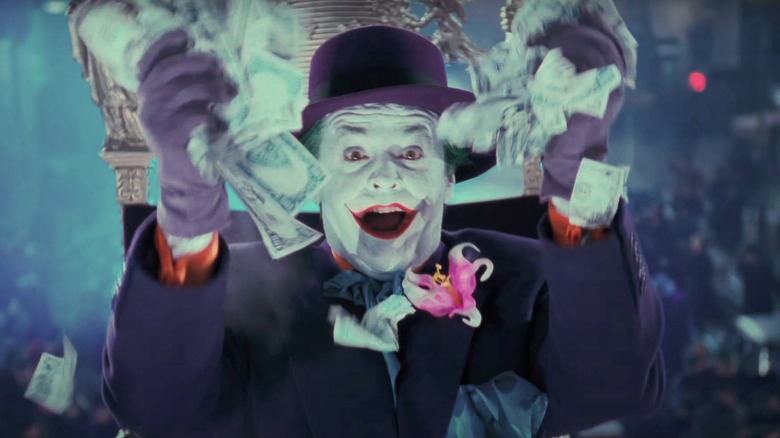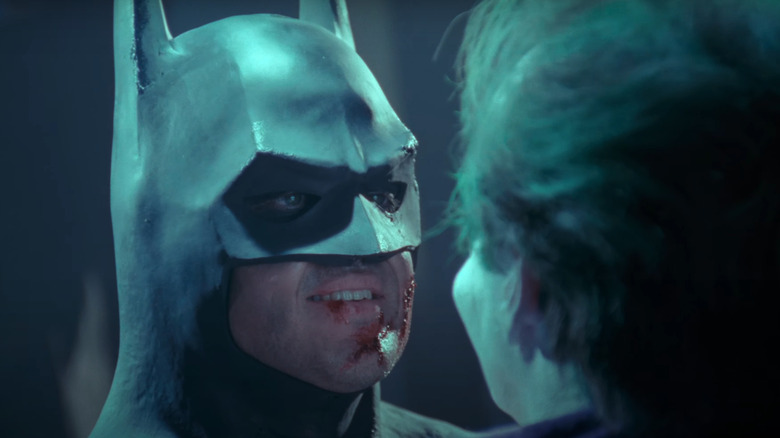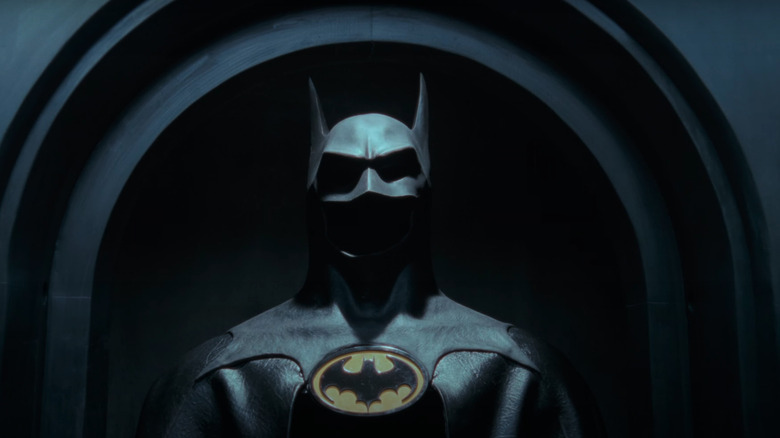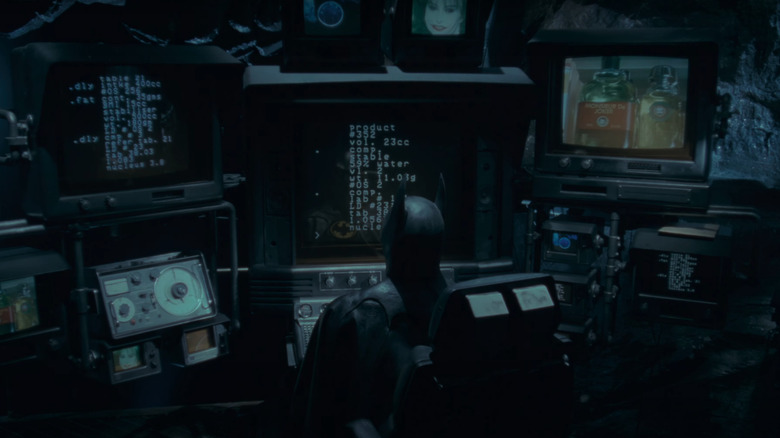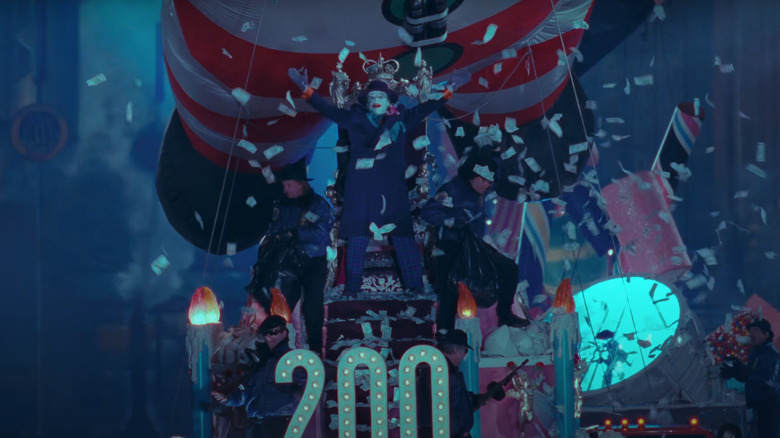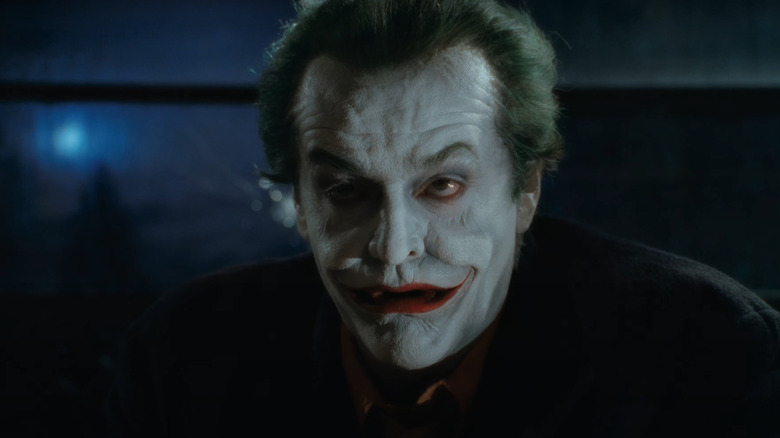Box Office Smash Batman Likely Never Made A Profit — And It Was The Joker's Fault
Despite his protestations that he shouldn't be treated "like the Medusa or the Lincoln Memorial," Jack Nicholson exudes exactly that kind of mythical aura. Before he gave up acting around 2010, he was on top of his game for decades, stringing hit movies together since the '60s and watching his star inexorably rise in the process. In the late '80s, with two Academy Awards under his belt, producer Jon Peters asked Nicholson to star as The Joker in Warner Bros. "Batman." The actor was in a position to demand pretty much whatever he wanted in exchange for lending his magnetic persona to Tim Burton's take on the Dark Knight.
Ever the cunning and intelligent thespian, Nicholson had a plan from the start, based on his intuition that "Batman" was going to become a cultural phenomenon — even before a single scene was shot. As he said in a making-of documentary, "I knew how big it was going to be." Yet he also concedes that he knew "they were totally unprepared for the level of the success of the movie." And so, the Oscar-winner agreed to reduce his usual $10 million fee to $6 million in exchange for a cut of the film's profits.
Just as Nicholson had predicted, "Batman" debuted in the summer of 1989 and became one of the biggest movies of all time, breaking records with a $40 million opening weekend. Eventually, Burton's Bat-flick would gross over $400 million worldwide (including a mid-'90s rerelease), establish a new blueprint for superhero movies, and boast one of the most expansive marketing campaigns in film history. Which is all very impressive, but from Warner Bros.' perspective, things weren't quite as straightforwardly rosy. And it seems that mythical figure, Nicholson himself, may well have been responsible for foiling Batman's success.
Why Batman probably never made a profit
With a budget of $35 million, "Batman" wasn't exactly an impoverished production. In fact, it was one of the biggest projects Hollywood had yet seen, with a massive 95-acre Gotham City set erected across 18 sound stages at the UK's famed Pinewood Studios. And while Nicholson was undoubtedly the film's biggest star, Kim Bassinger, who played photographer/Bruce Wayne's love interest Vicki Vale, and Michael Keaton in the lead role were far from unknowns. Burton, too, who had only made "Pee-wee's Big Adventure" and "Beetlejuice" at the time, had nonetheless acquired significant buzz in the industry despite being only 30 during the production of "Batman."
That all meant, as Alexander Knox actor Robert Wuhl put it, that "Batman" was "the biggest movie of all time," and "there was a lot of people's careers riding on this thing, especially at the Warner Bros. end." It's a good thing that the movie became the smash hit it did, then. At least, it would be if it weren't for some tricky accounting considerations that likely meant "Batman" never really made any significant profit for Warners, despite bringing in almost half a billion dollars worldwide.
Back in 1991, the LA Times reported that two years after its release, "Batman" was showing a "$35.8 million deficit" and would likely "never show profit." The Times blamed the financial woes on "extraordinary outlays for advertising, publicity and high-priced talent," which, considering the film's massive marketing campaign, multiple stars, and profit-sharing contracts, makes sense. But, as laid out by Entertainment Weekly, "Batman" had made more than $250 million at the box office at the time, which should have brought Warners' blockbuster at least out of the red. But this is Hollywood, where there's always some creative accounting going on behind the scenes.
How creative Hollywood accounting keeps hit movies in the red
Believe it or not, movie studios often aim to ensure their films don't make a profit — at least on paper. EW described it as "Hollywood's singular approach to bookkeeping," whereby studios do everything possible to make it look like they've made no money off even their most popular films. The most significant trick involves paying divisions of their own companies for things such as distribution and marketing to make it look like they've spent more money than they have.
This came to stark light when, after 2007's "Harry Potter and the Order of the Phoenix" became a $940 million hit, its ledger was leaked online. As Pop Matters reported, the breakdown revealed Warners had been up to some sorcery of its own, paying itself a whopping $212 million distribution fee alongside some other nondescript costs that were charged to the film. That was on top of paying $130 million for advertising, which likely mostly went to various Time Warner divisions. Thus, Harry Potter's fifth cinematic outing was officially recorded as a flop, losing $167 million for Warners.
Pretty sneaky, right? But why? What do the studios have to gain from making their films seem like failures? Well, it's more about what other people stand to gain — specifically, producers, directors, writers, and actors who often negotiate contracts to include a share of a film's net profits. But what if you've wiped out net profits using the aforementioned accounting trickery? That means no residuals. Meanwhile, the company has basically paid itself a sizeable chunk of the film's profits. That's why, back in 2009, LucasFilm told Darth Vader actor David Prowse that "Return Of The Jedi" hadn't make a profit, despite it grossing $475 million. Talk about using the force...
Batman's balance sheet
When it came to "Batman," Warners had a massive, $251 million (domestically) hit on their hands, and set about dutifully making it look like a flop. EW broke down the movie's expenses based on the LA Times report, including the infamous distribution fee which accounted for $80.4 million, or 32% of gross receipts. "Advertising and publicity" came in at an unbelievably high (for the time) $62.4 million. Remember, much of that likely went back into other Warner divisions. Then there was standard stuff like producing prints of the film, alongside editing, dubbing, and subtitling costs. Because "Batman" was such a hit for the studio, they also tacked a couple million dollars worth of trade association fees to the film. Hiring all the writers, actors, and production crew accounted for $53.5 million, while $9.7 million went to "misc. other" costs such as "freight and handling," "taxes and customs," etc.
All of which gets you somewhere around the $200 million mark already, leaving only around $50 million. And here's where Warner slipped up. That remaining cash was accounted for before any of the other costs were even paid. That's because multiple people involved with "Batman" had established gross profit-sharing clauses in their contracts. The key here is the "gross" part. According to the LA Times, Keaton, producers Peter Guber and Jon Peters, and Burton all had "advances-against-gross" in their agreements, meaning they got paid a percentage of the film's total profits before other costs were taken out. In other words, Warner had to pay the director, Keaton, and the movie's producers before they could pull the usual trick of not paying net profit shares by claiming there were none.
The Joker's big payday
Remember when I told you Jack Nicholson saw the success of "Batman" coming and negotiated for a share of the profits? And remember how I told you he's a smart guy? Well, not only did he negotiate for a gross-profit share, he negotiated for one of the most lucrative deals in Hollywood history.
There's no doubt much of the success of "Batman" is down to Nicholson, whose Joker remains a standout part of the seminal film — even if Burton needed a translator to understand him. The actor brought some serious gravitas to "Batman," and he knew it. He was, therefore, determined to be fairly compensated. Unlike Keaton, the producers, or even Burton, however, the Oscar winner was not only given an advance of $6 million, he'd somehow finagled 15% of the film's gross profit — essentially guaranteeing him a huge payday when the movie hit big. But that wasn't all. According to the LA Times, he'd also ensured there was an "escalator clause" in his contract that saw his share of the gross receipts increase to as much as 20% as the movie made more money — which it famously did. At the time, Nicholson was reported as earning at least $50 million from the deal.
Of course, only stars of Nicholson's caliber can get away with demanding these gross profit share agreements. It's a tactic that's proved fruitful for Robert Downey Jr., who in 2013 confirmed to GQ that he had negotiated a share of the gross profits from the "Avengers" movies, netting him a Nicholson-sized payday of around $50 million. According to the Iron Man actor, Marvel wasn't too happy about it, either: "They're so pissed. I can't believe it. I'm what's known as 'a strategic cost.'"
Was Batman really a flop?
Though Warners may have been one-upped by Nicholson, that didn't stop them from pulling yet more accounting tricks to gain back what they could. Among the line items from the LA Times report was "interest," which back in 1991 accounted for $10.9 million and basically functioned as a way for Warners to keep the break-even point of their film perpetually out of reach from the actors who'd agreed to the inferior net-profit share in their contracts.
After "Batman" debuted, a legal battle arose between the original owners of the film rights to the "Batman" franchise, Benjamin Melniker and Michael E. Uslan, and producers Jon Peters and Peter Guber. Melniker and Uslan's involvement in "Batman" was heavily scaled back and the pair were ultimately given "nominal credit as executive producers, stripp[ing] them of creative involvement and consulting rights, and grant[ing] them 13 percent of net profits." There's that phrase again — "net profits." Of course Uslan and Melniker likely never saw much in the way of net profit shares, as Warner worked to keep what it had left after paying Nicholson and the other gross profit beneficiaries.
With 30 years between now and when the LA Times first reported on "Batman" and its deficit, the folks at Warners have had a lot of time to try to up the interest and make up the difference. Merchandising income and licensing deals may have even allowed the studio to finally overcome the gargantuan hole left by paying out Nicholson's residuals. It could also be that those residuals have kept the movie perpetually in the red ever since it first debuted. Meanwhile, Nicholson doesn't have to worry about any of it. He can rest easy in retirement, allowing his mythical stature to grow ever greater as the residuals keep on coming.
